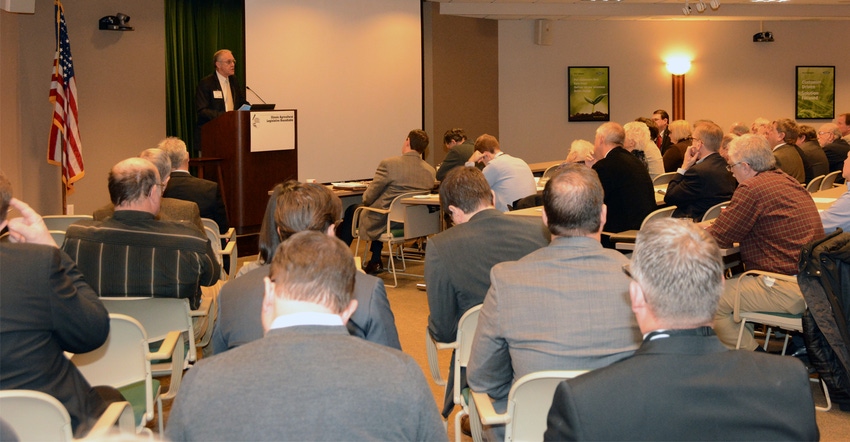
Warren Goetsch, deputy director of the Illinois Department of Agriculture, addressed the Illinois Agricultural Legislative Roundtable last week. And while IDOA is (again) beginning a calendar year without a budget, Goetsch is still optimistic.
“People forget the stopgap budget included a full-year appropriation for other state and federal funds. We’re in good shape,” Goetsch said. Goetsch stood in for Director Raymond Poe, who was unable to attend.
“The department is 90% regulatory, and I believe we do a good job promoting the industry,” Goetsch said. “We don’t know what’s coming in the next few months, but if we continue to work together, we will make agriculture something we can be proud of for years to come.”
Among his updates on the department:
• Illinois Nutrient Loss Reduction Strategy. Goetsch said the joint effort with IDOA, Illinois EPA and many other public and private partnerships is making a real difference. He applauded the voluntary approach to improve water quality both in Illinois and downstream in the Gulf of Mexico. Goetsch also referenced a recent USDA National Agricultural Statistics Service study. Despite a 40% participation rate, the study shows 80% of the respondents using maximum return to nitrogen (MRTN) guidelines. He added that the survey and data from other partners will be part of a biannual report to be released this summer.
• Medical cannabis. In what is a relatively new area of jurisdiction for the department, Goetsch said $18 million worth of wholesale medical cannabis was sold in Illinois in 2016, and 13,000-plus patients have been able to access medical cannabis.
• Illinois State Fair. Goetsch chuckled as he reported the 2016 Illinois State Fair set both good and bad records, including 5 plus inches of rain on the first night that led to flooding and closures of parking lots for the duration of the fair. “But the good news is no one died or was seriously injured,” he added.
2016 marked the highest grossing grandstand lineup, with the most tickets sold since 1999. The junior livestock exhibitor age expansion, passed by IDOA in September 2015, led to a 22% increase in junior exhibitors from 2015 to 2016. Only dairy and goat entries were down.
Goetsch corrected reports on an upcoming survey of fairgoers; he said they are not surveying fairgoers because of perceived problems, explaining that the department regularly conducts surveys to improve its product and remain relevant to fairgoers.
He added that a total solar eclipse will occur on Aug. 21 during the DuQuoin State Fair, where spectacular views are predicted to take place across southern Illinois. “We encourage all to take advantage of our affordable campgrounds on the DuQuoin State Fairgrounds!”
Goetsch did not mention state fair livestock drug test problems or proposed changes.
• Conservation. IDOA has submitted grants to the state comptroller’s office. One is targeted funding for priority watersheds as part of the Illinois Nutrient Loss Reduction Strategy, and the rest will be distributed through the 16 land use councils through soil and water conservation districts.
“Money should be coming, but you’ve heard that before,” Goetsch said.
• Extension. The financial picture is similar for Extension, Goetsch reported.
“I wish I had more to tell you,” he said. “We’re in the process of getting what funding we can out to Extension.” That funding would be for the first two quarters for programs that include statewide youth programs and Cook County Extension.
Goetsch blamed delayed money transfers from the general revenue fund, which delayed IDOA’s ability to provide state dollars that match county Extension funding. “We hope it will be rectified in the future,” he added.
• Legislative front. Goetsch said the department would like to see legislative work to clean up duplicative statutes, which require more work and money than necessary. For example, Illinois statute requires IDOA to publish a book listing Illinois cattle brands, something Goetsch says isn’t necessary in the electronic age. Other areas, like multiple meat-processing registrations and specialty farm product buyer rules tend to require more staff time than they generate in fees.
“Agriculture and the success of our industry is vitally important to Illinois, and what happens in the capital in the coming months will be important for years to come,” he concluded.
About the Author(s)
You May Also Like






